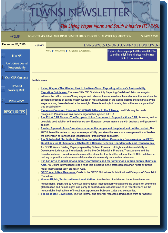 |
In this issue: - Living Wages - The Missing Link in the New Global Reporting Initiative's Sustainability Reporting Guidleines. The new GRIs "G3 Sustainability Reporting Guidelines" fails, once again, to address the critical issue of living wages and relies on the same old multilateral norms that condone the corporate practice of paying misery wages in most countries in the South, despite the fact that a living wage has long been declared a human right. There is an implicit missing link in the world's pursuit of true sustainability,
- Panama's Consumo Etico and APRONAD Adhere to the Alliance. Last February two well-recognized Panamanian civil society organisations joined TJSGA,
- The EU: A CSR Fiasco - The European Union Continues to Support a Mock CSR. As usual, and in complete contradiction with real democracy, European governments side with business and ignore civil society,
- Serving Systemic Transformations to serve the people and the planet and not the market. The 2005 Lifeworth's review of corporate responsibility perceives the seeds of a new generation of leaders, the generation of transcending leadership for transforming capitalism,
- The Substantial Flexibility in Handling Complaints About Companies Contravening the OECD Guidelines for Multinationals, Obstructs a Balance Between Confidentiality and Transparency. An OECD Watch Briefing Paper prepared by Colleen Freeman, of Rights and Accountability in Development, discusses the rationale behind the Confidentiality Principle, Transparency and the Specific Instance Procedure and exposes the obstacles that limit the value of the OECD Guidelines in making corporations observe a socially and environmentally responsible behaviour,
- It is business as usual among major sport brands and the sweatshops in their supply chains in Asia. An Oxfam International Report finds little progress in the protection of human rights by twelve major international sport brands in Asia,
- OECD Watch New Resource: Guide to the OECD Guidelines for Multinational Enterprises' Complaint Procedure,
- Human Rights, Trade and Investment Matters. A collection of articles on trade, investment and human rights, published by Amnesty International, intended partly to advance the debate on economic globalization and human rights and partly to contextualize concerns raised in recent reports on the human rights implications of investment agreements between states and companies,
- Top Resource Downloads. The top internal and external resources downloaded from our website.
LIVING WAGES - THE MISSING LINK IN THE NEW GLOBAL REPORTING INITIATIVE'S SUSTAINABILITY REPORTING GUIDELINES
The Global Reporting Initiative (GRI) released in January its draft version of its new Sustainability Reporting Guidelines, named the G3. The GRI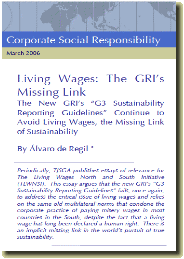 is a multi-stakeholder process and independent institution. It defines its mission as making sustainability reporting as routine and comparable as financial reporting, a sort of triple-bottom line, often mentioned by other civil organisations, encompassing the financial, environmental and social roles of business. The GRI has become the popular framework for Corporate Social Responsibility reporting, on a voluntary basis, for several hundred organizations, mostly for-profit corporations. is a multi-stakeholder process and independent institution. It defines its mission as making sustainability reporting as routine and comparable as financial reporting, a sort of triple-bottom line, often mentioned by other civil organisations, encompassing the financial, environmental and social roles of business. The GRI has become the popular framework for Corporate Social Responsibility reporting, on a voluntary basis, for several hundred organizations, mostly for-profit corporations.
The GRI claims to be the result of a permanent interaction with many people that supposedly represents a wide variety of stakeholders relative to the impact of the activity of business around the world. Yet, these groups appear to represent only those who are "practitioners" of the GRI framework and not of the entire spectrum that would represent all sectors of global civil society as a whole. The fact is that living wages continue to be absent, as a reporting indicator, from the GRI framework.
In this way, the absence of the critical issue of a living wage leads to the conclusion that there is a consistency in the avoidance of this issue by the process followed by the GRI multi-stakeholder working groups, at least since 2002, supposedly created to continuously improve its reporting guidelines. In a globalised economy, we have endured the globalisation of labour markets, prices and consumers but not of labour endowments. The benefits have been privatised, but the costs have been socialized. Nonetheless, the grim and unavoidable reality is that there cannot be sustainability without social justice. Yet, living wages is an element that has been systematically excluded by multilateral organisations, governments and the so-called multi-stakeholder initiatives, such as the GRI. To the credit of the GRI, our perception is that they are, by far, the organisation most open to engaging all sectors of global civil society and somehow listening to their views. Yet the GRI, too, has ignored our call to review the Guidelines addressing the issue of wages and labour compensations. Thus, the GRI framework continues suffering from the missing link in true sustainability: the reporting by corporations of whether their labour endowments provide workers with a living wage or with exploitative wages of servitude, as is the rule-of-thumb for corporations active in the South.
This paper also discusses other G3 limitations of major concern, namely, the continued extreme flexibility in the use of the guidelines in a global context of voluntary reporting relative to how the activity of business affects economic, social and environmental sustainability.
Download the pdf copy of the full essay here. TOP
PANAMA'S CONSUMO ÉTICO AND APRONAD ADHERE TO THE ALLIANCE
Consumo Etico came about with the mission to contribute to a more egalitarian national development, through the promotion of the organisation and defence of Panamanian consumers. CE'S actions are organised as follows: ▪ Strengthening the National Consumer Network by incorporating community organisations and strategic allies, ▪ Representing and defending consumers before state and private entities, ▪ Formulating and executing self-evident projects of sustainable consumption and poverty eradication, ▪ Organising campaigns aimed at mobilising citizens against the predatory and abusive practices of transnational corporations, ▪ Establishing contacts, agreements and alliances with international organisations that promote similar initiatives.
APRONAD was created with the mission of contributing to national development with the strategic goal of promoting sustainable development with a focus on gender, by means of gathering and mobilising the technical and financial resources, nationally and internationally, publicly and privately, in support of the building of community-based self-management capacities, and of micro and small businesses, as a precondition to achieving economic growth with distributive justice and with a high degree of citizen participation.
Its work is executed in three main areas: ▪ The Protection and conservation of the environment ▪ The combat of rural and urban poverty ▪ The promotion of a democratic culture anchored on the strengthening and participation of community organisations and of a new leadership
Additionally, APRONAD has expressed interest in the development of a corporate social responsibility practice in Panama. Both organisations have jointly established a Strategic Alliance to closely work in the creation of a National Consumer Network in Panama, and have decided to jointly adhere to TJSGA for they have found important affinities in several areas of activity. In this way, TJSGA will support both organisations in the development of the dynamics for organising and protecting Panamanian consumers and in the development of Corporate-Social-Responsibility initiatives. Both areas strategically compliment each other in the development of an egalitarian, democratic and ultimately sustainable ethos. For further information, visit their respective websites:  
TOP
RESOURCE CENTRE
THE EU: A CSR FIASCO - THE EUROPEAN UNION CONTINUES TO SUPPORT A MOCK CSR The European Union fails once again to take corporate accountability seriously by not addressing the concerns of civil society and by refusing to give its nod to the development of a CSR regulatory framework. It insists on a voluntary approach that is up to the "goodwill" of corporations. Reacting to this position, the International Federation for Human Rights (FIDH) and Amnesty International have issued a press releases denouncing that the European Union has in fact taken a step backward, which reflects a business approach to CSR, for it is based on a lowest common denominator approach, which demonstrates an unwillingness of the Commission to fully assume its role on this issue.
Both institutions express their disappointment regarding the long-awaited Communication of the European Commission entitled "Implementing the partnership for growth and jobs: making Europe a pole of excellence on Corporate Social Responsibility" Download the press release here. Download the EU document here.
TOP
SERVING SYSTEMIC TRANSFORMATIONS - AN APPROACH TO ENCOURAGE SYSTEMIC CHANGE TOWARDS SUSTAINABLE DEVELOPMENT. THE 2005 LIFEWORTH'S REVIEW OF THE QUARTERLY JOURNAL OF CORPORATE CITIZENSHIP
The Lifeworth annual review of corporate responsibility senses a future where a new business leadership will transform the current business ethos to serve the people and not the market. The Lifeworth Review of 2005 incorporates the quarterly reviews of the Journal of Corporate Citizenship. Contributing to the growing call for a complete transformation of the current unsustainable system, the authors call the key players of the system to recognise that the world cannot continue to operate under the present market-driven ethos and, thus, that a new model with new values must be developed if we really aspire and desire to have a future.
The authors sense that a few companies, at the cutting edge of corporate citizenship, are beginning to recognise that the failures of the market system must be addressed. These companies realise that they will be incapable of making their business model sustainable without the support of governments, consumers and investors. In the authors' opinion, the corporations will approach governments to make them address the market failures; they will work to empower consumers to develop a responsible and sustainable consumption culture -implementing sustainable production and responsible marketing and advertising- and will convince investors to engage in sustainability, so that they give the necessary latitude to the managers of their corporations to operate with long-term vision and goals. To be sure, there is no altruistic ulterior motive in corporations. Yet, as Jem Bendel, founder of Lifeworth, explains, they are exploring how to work together with the other players in order to cultivate a business case for a systemic change in society that engenders a truly sustainable ethos; a motive quite commendable from a sustainability perspective. In this way, with the same growing vision shared by The Jus Semper Global Alliance and by opinion leaders in the CSR arena, such as Allen White in his Fade Integrate or Transform - The Future of CSR, the Lifeworth Review of 2005 strives for a fundamental rethinking of capitalism to transform it, with the development of a new corporate leadership, across cultures and across sectors, that leads into a new global social ethos in the interest of the people and the planet and not the market. must be addressed. These companies realise that they will be incapable of making their business model sustainable without the support of governments, consumers and investors. In the authors' opinion, the corporations will approach governments to make them address the market failures; they will work to empower consumers to develop a responsible and sustainable consumption culture -implementing sustainable production and responsible marketing and advertising- and will convince investors to engage in sustainability, so that they give the necessary latitude to the managers of their corporations to operate with long-term vision and goals. To be sure, there is no altruistic ulterior motive in corporations. Yet, as Jem Bendel, founder of Lifeworth, explains, they are exploring how to work together with the other players in order to cultivate a business case for a systemic change in society that engenders a truly sustainable ethos; a motive quite commendable from a sustainability perspective. In this way, with the same growing vision shared by The Jus Semper Global Alliance and by opinion leaders in the CSR arena, such as Allen White in his Fade Integrate or Transform - The Future of CSR, the Lifeworth Review of 2005 strives for a fundamental rethinking of capitalism to transform it, with the development of a new corporate leadership, across cultures and across sectors, that leads into a new global social ethos in the interest of the people and the planet and not the market.
The authors have named this edition: Serving Systemic Transformations, for, as Jem Bendel reflects, it embodies the new confidence of a profession and movement that arises out of an awareness of serving something greater than itself, with the conviction that it is beginning to transcend leadership to transform capitalism as we know it.
Download Lifeworth`s Review pdf file by Clicking here.
TOP
THE SUBSTANTIAL FLEXIBILITY IN HANDLING COMPLAINTS ABOUT COMPANIES CONTRAVENING THE OECD GUIDELINES FOR MULTINATIONAL ENTERPRISES, OBSTRUCTS A BALANCE BETWEEN CONFIDENTIALITY AND TRANSPARENCY
The major findings of the brief are: - There continues to be disparity in the way the National Contact Points (NCPs) balance the competing demands of confidentiality and transparency when handling specific instances. The NCP is the entity appointed by each government that has endorsed the Guidelines for promoting their adherence and for handling 'specific instances' submitted by complainants when the activities of companies contravene the Guidelines,
- Many NCPs have placed greater emphasis on confidentiality of the specific instance proceedings and sacrificed transparency,
- The absence of administrative procedures for handling specific instances, including the reporting of determinations, continues to be the
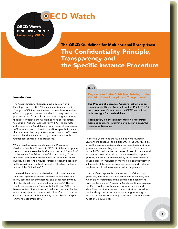 greatest obstacle to achieving a functional standard equivalence (the performance of the NCPs to the same standard relative to visibility, accessibility, transparency and accountability), greatest obstacle to achieving a functional standard equivalence (the performance of the NCPs to the same standard relative to visibility, accessibility, transparency and accountability),
- The Confidentiality Principle protects the parties involved after the complaint has been accepted by the NCP, unless otherwise agreed, but not before and without respect to the final determination taken by the NCP. Yet in the view of BIAC (the Business and Industry Advisory Committee, the voice of business at the OECD) and some governments, the Confidentiality Principle should govern all phases of the complaint in order to achieve trust among companies, for the publicity generated by civil society to gain support for its advocacy is adversarial in nature. However, the brief argues that this view is valid if the complaint is frivolous, for which there are already built-in protections. On the other hand, it is the experience of OECD Watch members that any positive outcome in a case is, at least in part, the result of publicising the initial filing of a complaint,
- Although BIAC asserts that the spirit of confidentiality in the Procedural Guidance (the instructions on the responsibilities of NCPs and Investment Committee - the OECD committee with oversight for the Guidelines) encompasses the integrity of the proceeding as a whole, both the Procedural Guidance and the Commentary on its interpretation do not support this argument. Instead, while proceedings are ongoing, it is entirely appropriate for complainants to make public statements about their specific instance if they wish. Confidentiality only protects information and documentation brought forth by the company during and after the proceeding,
- There are troubling signs that several NCPs want to extend confidentiality to all phases of the complaint. One obvious problem is that expanding confidentiality could encourage NCPs to delay procedures in an effort to both protect companies and silence civil society,
- Relative to transparency, there is concern in civil society as to whether NCPs comply with transparency guidelines by publicising the information they are handling, including the acceptance and determination of all cases, their annual report, and by periodically engaging civil society,
- It appears that divergences in the practice of disclosing information among NCPs persist. Some NCPs never publicise their determinations; some NCPs use "blanket confidentiality" as de facto policy,
The brief makes eight recommendations, which strive for a standard procedure for making transparent the state of the different phases of the proceedings for each instance, within a predefined timeframe, in an effort to address the lack of functional equivalence with respect to transparency and the specific instant process.
It is of the utmost importance to achieve a balance between transparency and confidentiality with the purpose of generating objective and timely determinations to solve complaints. Otherwise, if the perception of civil society is that NCPs tend to protect companies and silence complaints, the entire purpose of the OECD Guidelines would become a moot point. In that situation, many NGOs would ponder whether it is better to use the logic of the market and mobilise consumers, and completely bypass the bureaucratic and political hurdles of the NCPs; for, in that scenario, it is likely that we would trigger a much faster and positive reaction from the companies involved.
Download the OECD Watch Briefing Paper here.
TOP
TWELVE MAJOR SPORT-BRAND'S EFFORTS TO APPEASE DEMANDS FOR CORPORATE REPONSIBILITY ARE STILL A LONG WAHY FROM ENDING AN ETHOS OF LABOUR EXPLOITATION IN ASIA
An Oxfam International collaborative report concludes that global sportswear corporations cannot, on their own, even if they wanted to, create the conditions for an ethos where labour rights are fully respected. Many of the owners of the sweatshops in the supply chain are adamantly against the respect for human rights and their governments usually support them. the conditions for an ethos where labour rights are fully respected. Many of the owners of the sweatshops in the supply chain are adamantly against the respect for human rights and their governments usually support them.
Governments must get involved since they are directly responsible for ensuring the respect of human and labour rights. Yet corporations, if they wanted to, have all the leverage necessary for making governments ensure that trade union rights are properly respected at their supply chains. For, in the same way that these governments feel a constant threat by corporations of moving to friendlier countries and losing foreign direct investment if they dare to regulate their behaviour, corporations, if they wanted to, could easily threaten governments with leaving if they do not uphold labour laws and ensure that labour and human rights are protected.
This latter position would be supportive of truly democratic governments. Obviously, this is not the case at all with these global brands, which are ultimately in control of the situation and they want it to remain as is. Not surprisingly, the report concludes that there are no sports brand owners active in Asia undertaking comprehensive and effective programs to ensure respect for trade union rights in their supply chains. Much less, as Oxfam also reports, are these corporations willing to commit to the payment of a living wage. In this way, it is the own conclusion of TJSGA that these brands continue to do business as usual regardless of some token initiatives in labour rights described in this report.
The international sport brands included in the report are: Adidas, ASICS, FILA, Kappa, Lotto, Mizuno, New Balance, Nike, Puma, Reebok, Speedo and Umbro.
Download the Oxfam report here. TOP
OECD WATCH NEW RESOURCE: GUIDE TO THE OECD GUIDELINES FOR MULTINATIONAL ENTERPRISES' COMPLAINT PROCEDURE. LESSONS FRON PAST NGO COMPLAINTS
The OECD "Guidelines for Multinational Enterprises" embody what member governments have agreed are the basic components of responsible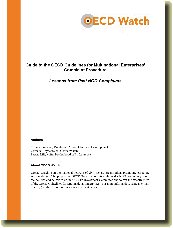 corporate conduct for corporations on a voluntary basis. They cover a range of issues such as labour and human rights, the environment, bribery and corruption and information disclosure. corporate conduct for corporations on a voluntary basis. They cover a range of issues such as labour and human rights, the environment, bribery and corruption and information disclosure.
After five years and nearly 50 NGO complaints, OECD Watch members understand how to construct a complaint, issues NGOs should consider before submitting a complaint, how the complaint process has been typically handled by NCPs and what roadblocks NGOs could encounter. This guide was designed with these experiences and lessons in mind. A number of guides and reports exist to advise NGOs on specific aspects of the Guidelines. These earlier publications continue to be important resources for NGOs that are considering filing complaints. This guide is meant to supplement the existing NGO resources.
Download the OECD Watch Guide here. TOP
AMNESTY INTERNATIONAL: HUMAN RIGHTS, TRADE AND INVESTMENT MATTERS
This collection of articles on trade, investment and human rights is intended partly to advance the debate on economic globalization and human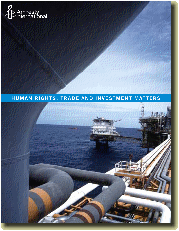 rights, and partly to contextualize concerns that Amnesty International has raised in recent reports on the human rights implications of investment agreements between states and companies. rights, and partly to contextualize concerns that Amnesty International has raised in recent reports on the human rights implications of investment agreements between states and companies.
The last decade has been marked by a rapid increase in trade and investment facilitated by the World Trade Organization, by international and regional financial institutions and by regional and bilateral trade agreements. The role of emerging economies, such as China, India, Taiwan, Malaysia and South Korea as major investors in developing countries, has created a new dynamic in so far as northern-based multinationals are now confronted with a fresh competitive challenge: how to compete against companies that have low labour costs, are not under effective legal constraints or reputational pressure to observe human rights standards, and have no qualms about operating in countries and contexts where human rights are routinely violated and where such violations form the back-drop to the companies' activities.
The first section of this journal focuses on the role of financial institutions in shaping standards. The second section reveals the scope of the problem by exploring some of the connections between trade, investment and human rights. The third section explores the potential for integrating human rights into trade and investment agreements. The final section focuses on the legal accountability of companies for the impacts of their investment.
This publication is part of Amnesty International's continued commitment to exposing corporate involvement in human rights abuses, pressing national governments to regulate inward and outward investment to eliminate human rights abuses associated with business operations and lobbying national governments and international institutions to incorporate human rights protections into the rules and regulations of international trade and investment.
Download Amnesty International's publication here.
TOP
TOP RESOURCE DOWNLOADS Following are the top ten internal and external information resources downloaded from our website in the previous semester. Below the chart are the links for each resource if you want to download them: 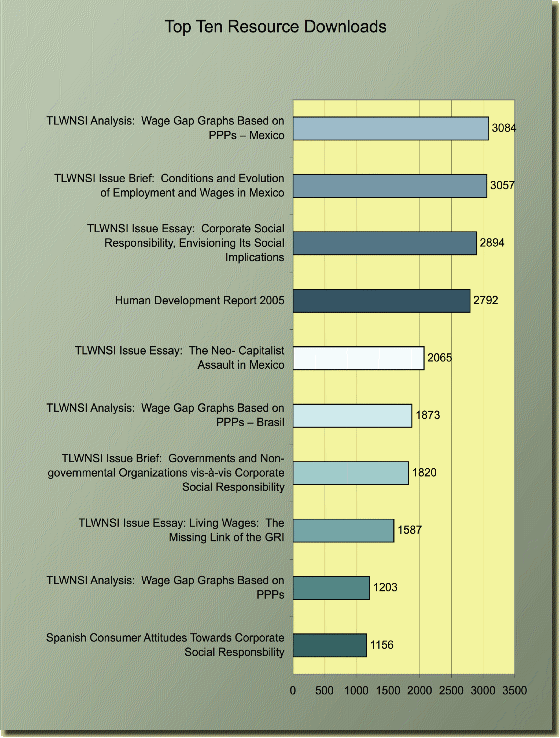 To download click below: 1.TLWNSI Analysis: Wage Gap Graphs Based on PPPs - Mexico
2.TLWNSI Issue Brief: Conditions and Evolution of Employment and Wages in Mexico
3.TLWNSI Issue Brief: Corporate Social Responsibility, Envisioning Its Social Implications
4.Human Development Report 2005
5.TLWNSI Issue Essay: The Neo-Capitalist Assault in Mexico
6.TLWNSI Analysis: Wage Gap Graphs Based on PPPs - Brasil
7.TLWNSI Issue Brief: Governments and Non-governmental Organizations vis-à-vis Corporate Social Responsibility
8.TLWNSI Issue Essay: Living Wages: The Missing Link of the GRI
9. TLWNSI Analysis: Wage Gap Graphs Based on PPPs
10. Spanish Consumer Attitudes Towards Corporate Social Responsibility
Thank you so much for your support. If you have any questions or comments, Please e-mail us: gsc@jussemper.org
If you are not a member of our eCommunity yet, please click here to sign up for TJSGA's eCommunity to receive our quarterly newsletter. If you do not wish to continue receiving our quarterly newsletter, just e-mail us writing in the subject "unsubscribe" nosuscrip@jussemper.org.
TOP |  |
















